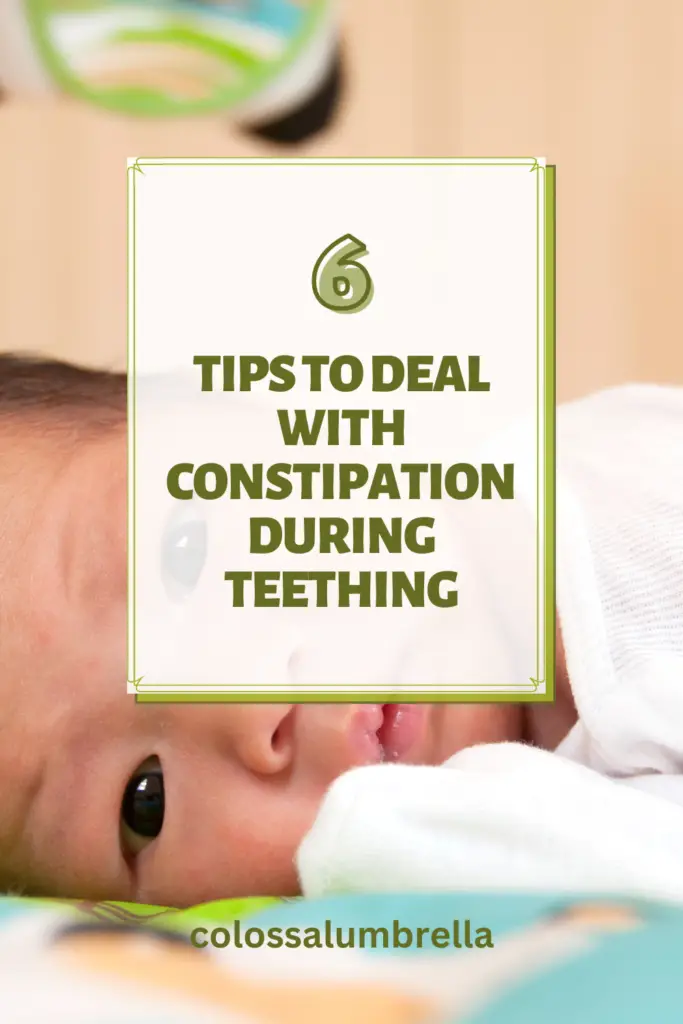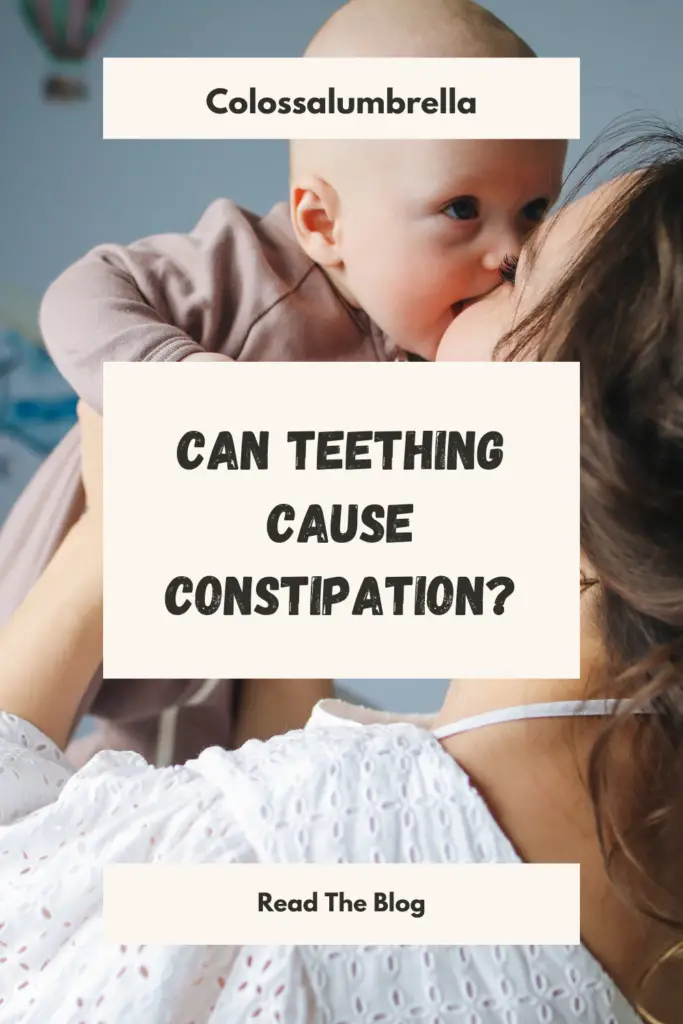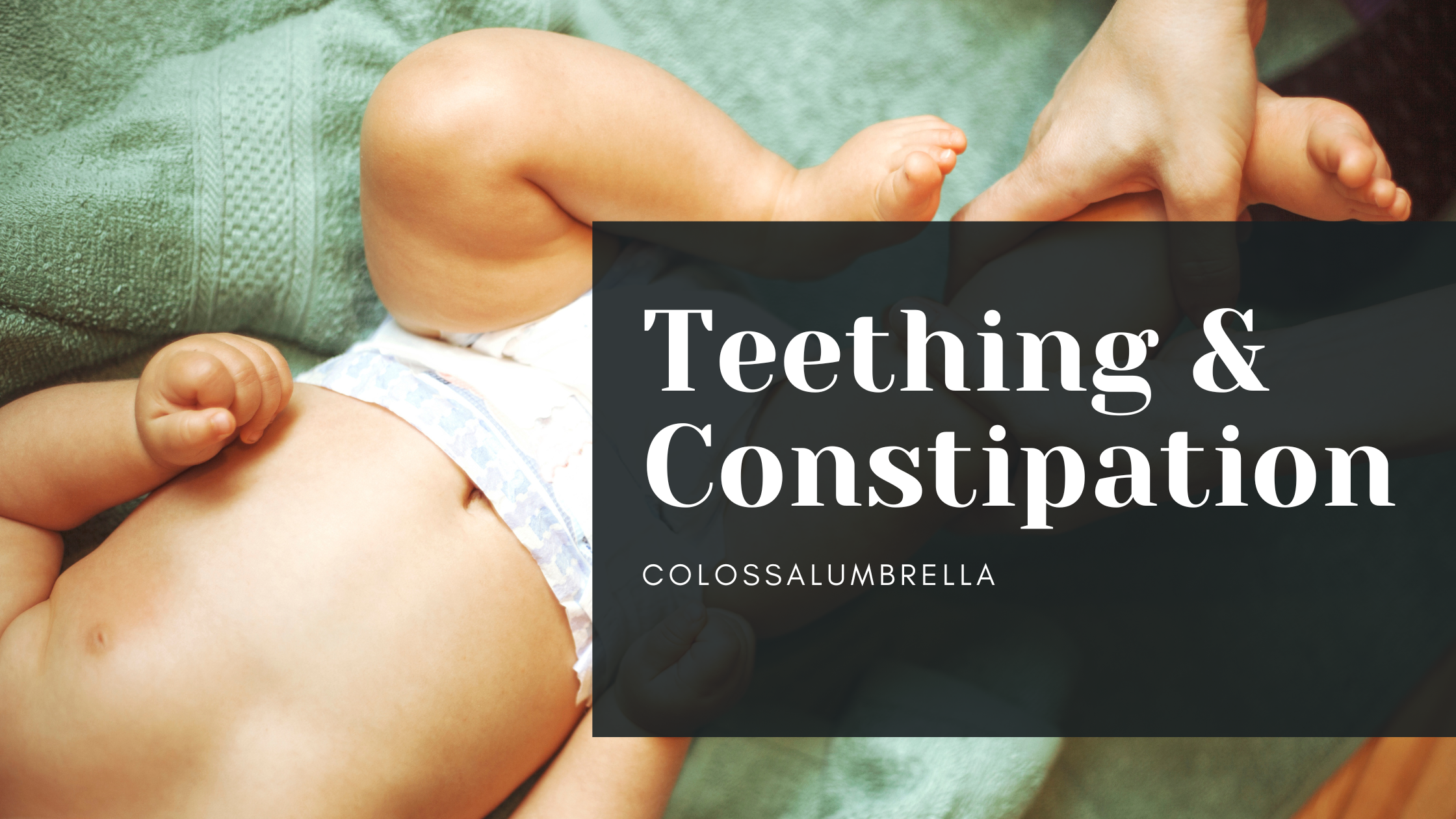Contents
This blog post dives headfirst into a topic that is bound to make you grin and grimace at the same time, Teething and its oh-so-fascinating potential connection to the mysterious world of baby bowel movements. That’s right, we’re here to explore the age-old question: “Can Teething Cause Constipation in Babies?”
Before we sink our teeth into the juicy details, let’s clarify a few things. First, we all know that teething is like a mini horror movie directed by Mother Nature herself. Those tiny pearly whites pushing their way through tender gums can turn our precious little angels into drooling, fussing creatures who seem to think gnawing on anything and everything is an Olympic sport. But could this epic teething saga also wreak havoc on our tiny tots’ digestive system? Can Teething Cause Constipation in Babies? In this comprehensive guide, we will explore the relationship between teething and constipation, debunk common myths, and provide actionable tips to alleviate any discomfort your little one may experience during this stage.
Teething and its effects
Teething is the process of primary teeth erupting through the gums. It typically begins around 6 months of age, but it can vary from baby to baby. During teething, babies may exhibit symptoms such as drooling, irritability, swollen gums, and a strong urge to chew on objects. However, it is important to note that teething does not directly cause constipation.
Subscribe to my blog for Parenting tips that will make you feel like a pro, and get access to exclusive free Printables that will keep your little ones busy and happy!
Can Teething Cause Constipation in Babies?
Contrary to popular belief, teething itself does not directly lead to constipation. The discomfort associated with teething can, however, indirectly affect a baby’s feeding habits, which may result in changes in their bowel movements. For example, some babies may become fussier during teething and may not want to eat as much as usual (5 ways to feed teething baby).This decrease in food intake can impact their digestive system and potentially lead to changes in their stool.
Teething and Constipation
Several factors could contribute to constipation during the teething phase. Firstly, increased drooling, a common symptom of teething, may result in swallowing less saliva. Since saliva helps lubricate the digestive tract, a decrease in swallowing could potentially affect the movement of food through the intestines, leading to constipation.
Additionally, dietary changes often occur during teething. Babies may become more reluctant to eat solid foods or drink fluids due to gum sensitivity, which can inadvertently result in a decrease in fiber intake. Adequate fiber is essential for maintaining regular bowel movements, so a reduction in fiber-rich foods could contribute to constipation.
Furthermore, teething discomfort can affect a baby’s overall appetite, causing them to eat less than usual. Reduced food intake, combined with other factors, might lead to slower digestion and decreased frequency of bowel movements.
Tips to Manage Constipation during Teething
Recognizing the signs of constipation in babies is crucial for managing the condition effectively. Parents should be aware of changes in their baby’s stool consistency, frequency, and the presence of any discomfort during bowel movements. If your baby is experiencing constipation during teething, here are some helpful tips to alleviate their discomfort:
Increase Fluid Intake
Ensure that your baby is getting enough fluids, as dehydration can contribute to constipation. If your baby is breastfed, continue to nurse on demand. If you have started introducing solids, offer water in a sippy cup throughout the day, in addition to breast milk or formula.
Fiber-Rich Foods
Introduce fiber-rich foods into your baby’s diet, such as pureed fruits and vegetables, whole grains, and legumes. These foods can help soften stools and promote regular bowel movements. Remember to introduce new foods gradually to allow your baby’s digestive system to adjust.
Tummy Massage
Gently massage your baby’s tummy in a clockwise direction to stimulate bowel movements. This can help relieve constipation and provide comfort to your little one during teething. Use a baby-safe oil or lotion to ensure smooth movements during the massage.
Offer Chilled Teething Toys
Teething toys that can be chilled in the refrigerator can provide relief to your baby’s sore gums. The cooling sensation can help soothe their discomfort and potentially improve their feeding habits, indirectly aiding in relieving constipation.
Consult Your Pediatrician
If your baby’s constipation persists or becomes severe, it is essential to consult your pediatrician. They can provide further guidance and recommend appropriate interventions if necessary. Your pediatrician may suggest gentle laxatives or other remedies to relieve constipation safely.

Additional Factors to Consider
While teething itself does not cause constipation, there are other important factors to consider when managing your baby’s digestive health:
Medications and Supplements
Certain medications, such as iron supplements, can contribute to constipation. If your baby is taking any medications or supplements, consult your pediatrician to determine if they could be a contributing factor. Your pediatrician may recommend adjustments to the dosage or alternative options to alleviate constipation.
Overall Health and Development
It is important to consider your baby’s overall health and development when addressing constipation. If your baby is experiencing other symptoms, such as vomiting, weight loss, or extreme discomfort, it may be a sign of an underlying health issue. In such cases, seek immediate medical attention.
Individual Differences
Every baby is unique, with their own individual patterns and responses. While some babies may experience changes in bowel movements during teething, others may not be affected at all. Pay attention to your baby’s specific needs and consult your pediatrician if you have any concerns.
Debunking Common Teething Myths
There are several myths surrounding teething that can cause unnecessary worry for parents. One prevalent myth suggests that teething causes fever. While an elevation in body temperature can occur during teething, it is typically mild and should not exceed 100.4 degrees Fahrenheit (38 degrees Celsius). If a baby develops a high fever, it is essential to consult a healthcare professional.
Another common misconception is that teething is the sole cause of diarrhea. While some babies may experience loose stools during teething, it is not the only potential factor. Other factors, such as dietary changes or illness, can coincide with teething symptoms, leading to diarrhea. If diarrhea persists or is accompanied by other concerning symptoms, medical attention should be sought.

People Also Ask
Why do babies suddenly get constipated?
Babies can experience constipation due to various reasons such as changes in diet, introduction of solid foods, dehydration, lack of fiber in their diet, or a digestive system that is still developing.
What age do babies get constipated?
Babies can experience constipation at any age, but it is more common when they start consuming solid foods, typically around 4 to 6 months of age. However, constipation can occur at any stage of infancy.
How long will teething symptoms last?
The duration of teething symptoms can vary from one baby to another. Typically, the symptoms can start a few days before the tooth erupts and may last for a few days or weeks after the tooth emerges. However, teething is a gradual process, and some babies may experience intermittent symptoms for several months. If you have concerns, consult your pediatrician for further guidance.
Conclusion
While teething itself does not cause constipation, the discomfort associated with teething can indirectly impact a baby’s feeding habits, potentially leading to changes in bowel movements. By understanding the relationship between teething and constipation, and implementing the tips provided in this guide, you can help alleviate any discomfort your baby may experience during this developmental milestone. Remember, if your baby’s constipation persists or becomes severe, consult your pediatrician for further guidance and support.
Disclaimer: The content of this blog is for informational purposes only and is not intended to be a substitute for professional medical advice, diagnosis, or treatment. Always seek the advice of your physician or other qualified healthcare providers with any questions you may have regarding a medical condition.
I would stay connected and keep you updated with parenting tips, pregnancy guides, creative ideas, easy crafts, and Free Printables. Subscribe to Colossalumbrella to get new ideas delivered to your inbox. Follow me on Facebook, Pinterest, Twitter, and Instagram.
